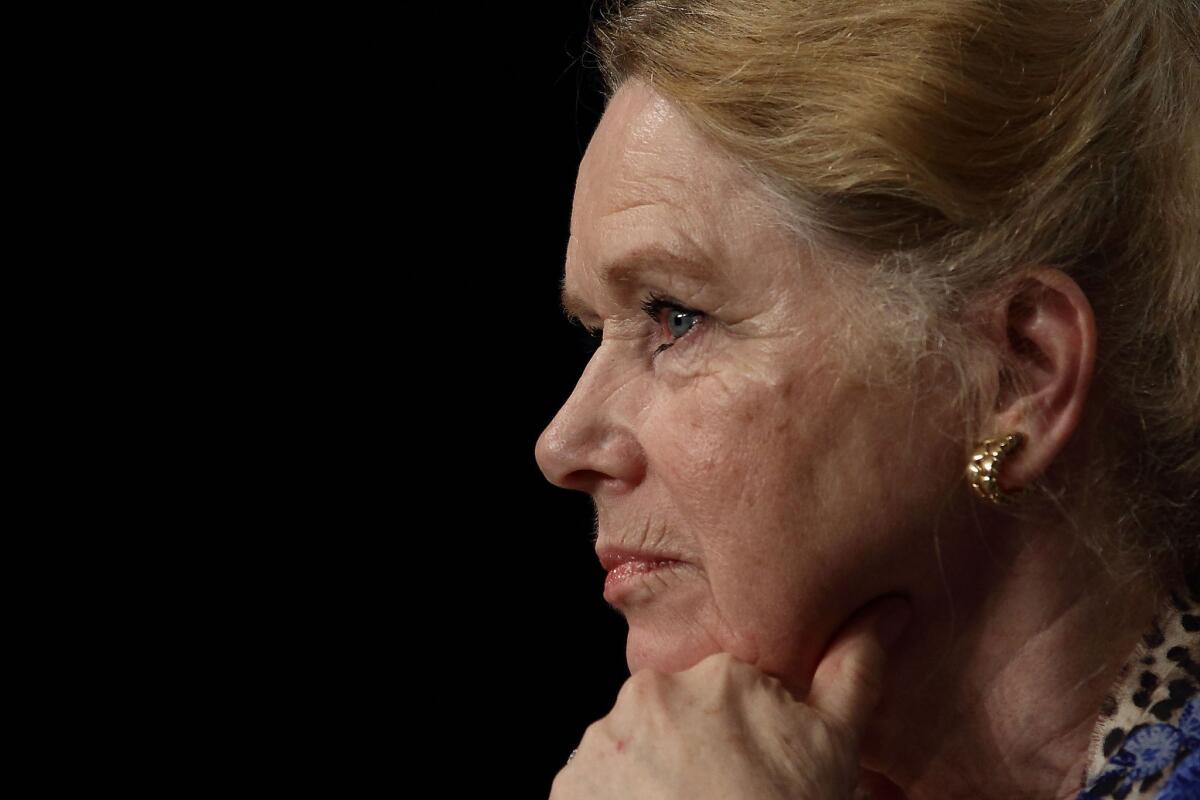Liv Ullmann follows her own muse to write, direct ‘Miss Julie’

- Share via
Norwegian actress Liv Ullmann was one of Ingmar Bergman’s most luminous muses, appearing in several of the Swedish filmmaker’s lauded dramas, including 1966’s “Persona” and 1976’s “Face to Face,” for which she earned a lead actress Oscar nomination.
But the 75-year-old Ullmann, who was also Oscar-nominated for Jan Troell’s 1971 drama “The Emigrants,” was often ashamed of her profession.
“I felt there are so many needy people in the world and so many other things one should do,” said Ullmann during a recent phone interview. “What is an actor?”
Her perception changed when she was asked to write the script for the 1992 Danish film “Sofie,” about a Jewish woman in Copenhagen in the late 19th century. “When they saw the script, they said why don’t you direct it? I actually called Ingmar and said, ‘Do you think I can direct?’ He said, ‘You can.’ After the first week, I knew this is what I really like to do. Suddenly, I knew how important it is to find the best actors and allow them to be creative.”
Though she’s acted sporadically over the past two decades, Ullmann has concentrated on directing such features as 2000’s “Faithless” and the acclaimed 2009 theater production of Tennessee Williams’ “A Streetcar Named Desire,” starring Cate Blanchett.
Her latest movie feature is the dark drama “Miss Julie,” opening Friday, which she adapted from Swedish playwright August Strindberg’s landmark 1888 three-character drama. Deemed obscene, the play was banned in Sweden until 1906.
Jessica Chastain stars as the rebellious daughter of a wealthy baron and his late domineering, man-hating wife. The daughter has been jilted by her fiance. Colin Farrell plays John, her father’s ambitious head servant, who wants to improve his station in life despite his disapproving fiancee, Kathleen (Samantha Morton), who is employed as the estate’s cook.
“Miss Julie” unfolds during one midsummer’s night at an Irish estate, when a bored and despondent Julie, who is still a virgin, enters the kitchen and begins to tease, cajole and seduce John. After they consummate their relationship, their dynamics shift. John becomes stronger, more cruel toward Julie, while she begins to unravel and grows increasingly desperate in her actions.
“It is about class struggle,” Ullmann said. “She goes into one area where she is not the master and puts everything in a horrible disarray for the people who are already there. I had a theory she is really walking with death. She has death as a partner. I believe Miss Julie is always tormented by conflict.”
Miss Julie and John, said Farrell in a separate phone interview, are two “essentially very strong-willed, sensitive creatures. Kathleen is not only the moral center of the piece, she is a presentation of a more balanced human being. The play, for my money, is a treatise on the trauma of origin — whatever the origin is, whether it be high society or low society.”
Ullmann had never played Miss Julie on stage. But she reread the play when she was preparing “A Streetcar Named Desire” because she knew that Williams had been inspired by the Strindberg play.
So when she was approached by producers to write and direct a film about a femme fatale, initially, “I didn’t think of anything, and then suddenly I heard myself say, ‘Miss Julie.’ It was very much in my memory.”
Because the producers wanted the film to be in English, Ullmann shifted the drama from Sweden to Northern Ireland because she said it would be “false” to have English-speaking actors pretending to be Swedish.
Farrell hadn’t seen many of Ullmann’s films but was aware of the “influence her work had on the broader cinema-loving community of the world. I loved her adaptation of Strindberg’s work that she did and just really wanted to be around her for a couple of months.”
Despite the low budget, Ullmann found the time to rehearse her cast over a 10-day period. “Liv was incredibly generous,” said Farrell. “It was extraordinary to be in that space. I really got to spend time with three very, very, very intelligent, incredibly strong and talented women.”
Though he loved working with Ullmann and his leading ladies, “Miss Julie” was emotionally taxing for the actor. “It was one of the toughest, if not the toughest, job I have done,” he said. “I would do it all over again, but I couldn’t say the actual work was enjoyable. The two characters are clawing at each other in the most heinous way. It was brutal.”
Twitter: @mymackie
More to Read
Only good movies
Get the Indie Focus newsletter, Mark Olsen's weekly guide to the world of cinema.
You may occasionally receive promotional content from the Los Angeles Times.










